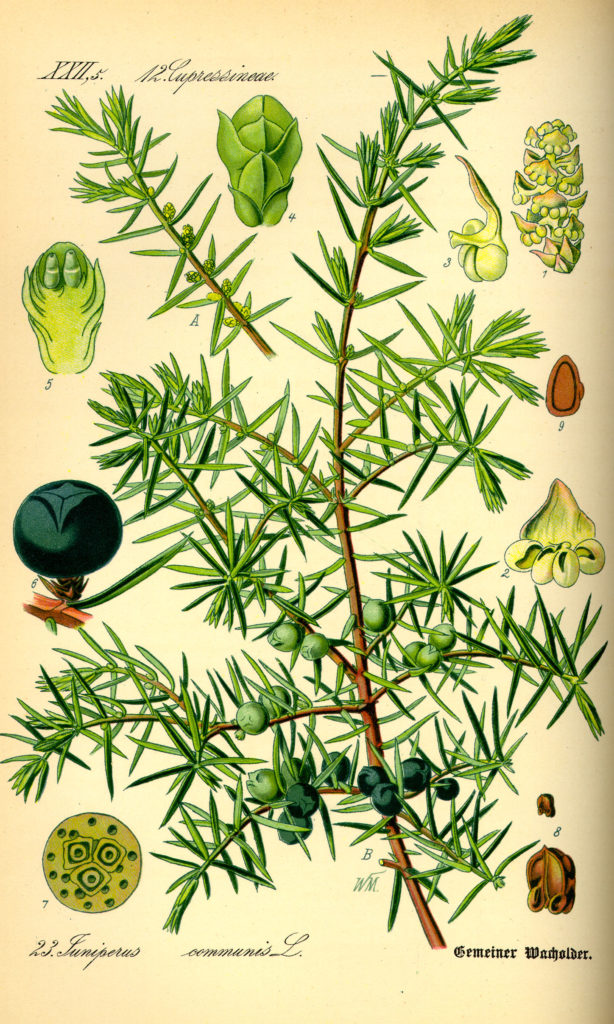Juniper has been used as medicine and for ritual for thousands of years by many cultures throughout the world. This powerful oil affects the digestive and nervous systems, emotional balance, and skin.
Here are some ways this ancient oil can help you in your everyday life:
- Prevents infection – The antiseptic properties can be applied to wounds and heal faster.
- Healthy glow – Aids in circulation of blood to help oxygenate the skin.
- Relieve cramping – It supports relaxing muscular, digestive, and intestinal uncomfortable spasms.
- Alleviates gas – Provides relief when gas builds up and creates upset in the torso.
- Remedies bloating –Unpleasant water retention is addressed as a diuretic, passed by elimination.
- Mild stimulant – By increasing stimulation in the brain, it can help to alleviate symptoms of depression and fatigue.
- General tonic – Helps support the bodies immune function as an antioxidant and remove toxins
Image source: http://Image source: https://upload.wikimedia.org/wikipedia/commons/4/4c/Juniperus_communis_cones.jpg By MPF (Own work) [GFDL (http://www.gnu.org/copyleft/fdl.html), CC-BY-SA-3.0 (http://creativecommons.org/licenses/by-sa/3.0/) or CC BY 2.5 (http://creativecommons.org/licenses/by/2.5)], via Wikimedia Commons
The story of Juniperus communis
This evergreen high desert shrub is native to North America in the western United States. Part of the Cupressaceae family, it produces blue berries that are steam distilled to produce the oil. Currently, the primary cultivation located in Eastern Europe, mainly for flavoring in liqueurs and gin.
In Scott Cunningham’s Encyclopedia of magical herbs, he identifies the qualities if Juniper as a masculine herb connected to the Sun and the fire element. It is connected to the spiritual powers of the herbs providing protection, anti-theft, love, exorcism, and health. Also can be added to love potions and can increase male potency, as well as increase psychic awareness and break curses or hexes.
Throughout ancient Europe, Juniper was burned to ward off evil spirits and demons for protection of homes and temples. Historically was planted outside apothecaries and infirmaries with the belief that its magic would keep witches away.It was used both medicinally and ritually to protect, purify, and fortify the health and the spirit from ills. The ancient Egyptians anointed the bodies of the dead with juniper oil, as well used the berries in cosmetics and perfumes. Even today, Tibetans use it as incense. Similarly, Native Americans burn it for purification ceremonies.

Image source: https://upload.wikimedia.org/wikipedia/commons/2/23/Illustration_Juniperus_communis0.jpg
Additional medicinal applications are:
- Acne
- athlete’s foot
- cellulite
- coughs
- cramps
- cystitis
- damaged tissue (protect)
- gout
- influenza
- insect repellent
- lymph node congestion
- muscular aches
- oily skin
- sciatica,
- seborrhea
- rheumatism, and wounds
Contains over 70 active constituents (primarily monoterpinenes):
- Alpha and Beta Pinene – anti-inflammatory, antibiotic, aids in memory
- Sabinene
- Camphene
- Myrcene – analgesic, antibacterial, antidiabetic, anti-inflammatory, anti-insomnia, antispasmodic
- Alpha Phellandrene – fungicidal, insecticidal
- Alpha Terpinene
- Gamma Terpinene – antimicrobial, anti-inflammatory
- Cineole
- Beta Phellandrene
- Para Cymene – antibacterial, antifungal, analgesic
- Terpineol – antioxidant, anti-tumor, sedative
- Bornyl Acetate – antimicrobial
- Caryophyllene – antidepressant, neuroprotective
- Trace amounts of Limonene, Camphor, Linalool, Linalyl Acetate, Borneol and Nerol.
Disclaimer: The statements contained on this website have not been evaluated by the Food and Drug Administration. This information is not intended to diagnose, treat, cure, or prevent disease.
Juniper is Generally Recognized as Safe (GRAS) by the U.S. FDA.
See the Cautions and counter-indications below:
- Do not use Juniper essential oil if you have any health issues with your liver, kidneys, or are pregnant or nursing.
- Do not use consecutively for more than 4 weeks. Take a break for a minimum of 2 weeks in-between using the oil.
- If the oil has been oxidized, it may cause skin irritation.
- As with all essential oils, always perform a small skin test to check for sensitivity prior to extensive use.
References:
Alpha-pinene (2016). . In Wikipedia. Retrieved from https://en.wikipedia.org/wiki/Alpha-Pinene
Aquanta LLC. (2016). α-Phellandrene and β-Sesquiphellandrene. Retrieved December 10, 2016, from turmeric.com, https://www.turmeric.com/table-ii4-alpha-phellandrene-and-beta-sesquiphellandrene
AyurvedicOils. (2016b, November 11). General uses of Para-cymene. Retrieved December 10, 2016, from ayurvedicoils.com, http://ayurvedicoils.com/tag/general-uses-of-para-cymene
AyurvedicOils. (2016, May 19). Pharmacological effects of gamma-terpinene. Retrieved December 10, 2016, from ayurvedicoils.com, http://ayurvedicoils.com/tag/pharmacological-effects-of-gamma-terpinene
Cunningham, S. (1985). Cunningham’s encyclopedia of magical herbs. San Francisco, CA, United States: Llewellyn Publications,U.S.
Essential Oils Informer. (2016b). 13 Juniper Essential Oil Tremendous Benefits. Retrieved 10 December 2016, from http://essentialoilsinformer.com/13-juniper-essential-oil-tremendous-benefits/
organicfacts.net. (2015b). Health Benefits of Juniper Essential Oil. Retrieved 10 December 2016, from https://www.organicfacts.net/health-benefits/essential-oils/health-benefits-of-juniper-essential-oil.html
Petersen, D. (2016). AROMA 101 Introduction to Aromatherapy. Portland, OR: American College of Healthcare Sciences.
Terpene profile: Myrcene. (2014, September 16). Retrieved December 10, 2016, from theleafonline.com, http://theleafonline.com/c/science/2014/09/terpene-profile-myrcene/
